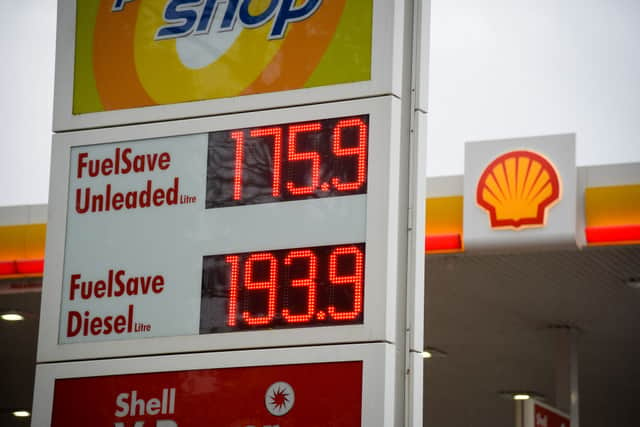Fuel retailers accused of hiking profits as drivers face new record high prices
and live on Freeview channel 276
Fuel retailers have been accused of exploiting hard-pressed motorists by extending their profits as petrol and diesel prices soar.
As diesel hit a new record high this week and petrol edged closer to its all-time peak, the RAC has said filling station operators are making even bigger profits than before the fuel duty cut was announced.
Advertisement
Hide AdAdvertisement
Hide AdIts analysis of fuel margins shows that retailers are making an extra 2p per litre compared with mid-March, before Chancellor Rishi Sunak cut 5p per litre from fuel duty.
Their margins are now 11p per litre for petrol and 8p for diesel, where in the month before the duty cut, they were 9p and 6p respectively.


The RAC’s fuel spokesman Simon Williams said it meant drivers were being denied potential savings and warned that the volatile price of oil made even more price rises inevitable.
The figures have prompted a warning from the Business Secretary Kwasi Kwarteng that forecourt operators must remember their responsibilities to treat customers fairly.
Advertisement
Hide AdAdvertisement
Hide AdOn Monday, the RAC reported that the average price of a litre of diesel had exceeded 180p for the first time. This was backed up by figures from analysts Experian Catalist, which also showed the fuel at 180.3p per litre. Separate government figures suggested it was 179.7p - a record high according to its own data.
Petrol has not yet returned to the 167.3p record set on 22 March but the RAC and Experian Catalist both report that it is currently at 166.8p and likely to rise.
Loading....
Mr Williams said: “With oil trading above $110 a barrel and the pound down to $1.20, it now looks inevitable that petrol will hit a new average price record in the coming days, spelling yet more misery for drivers.
“While March’s 5p-a-litre duty cut is making a difference, it’s not proved to be helping as much as the Government had hoped, which means there’s little to prevent prices going even higher.
Advertisement
Hide AdAdvertisement
Hide Ad“RAC analysis of fuel margins shows retailers – for whatever reason – are taking on average 2p a litre more than they were before the Chancellor’s 5p duty cut. The average margin for petrol is currently 11p a litre and for diesel 8p. To put this into perspective the long-term average margin for unleaded is 7.5p and for diesel 8p.”
In response to the latest figures, MrKwarteng has written to the industry to “remind them of their responsibilities”.
In the letter, Mr Kwarteng said motorists were rightly concerned about the pace of price increases at the pumps and “rightly frustrated that the Chancellor’s fuel duty cut does not appear to have been passed through to forecourt prices in any visible or meaningful way”.
He wrote: “The Chancellor and I therefore want to re-emphasise and communicate again our expectation that members do everything possible to ensure that drivers are getting a fair deal across the country.”
Advertisement
Hide AdAdvertisement
Hide AdThe Petrol Retailers Association, which represents independent filling stations blamed rising oil prices, lower demand and “additional expenses” for apparent disparity between prices and profit margins.
Its executive director, Gordon Balmer said comparing pump prices with wholesale prices “only gives a partial picture” and retailers were competing on the “thinnest of margins”.
He claimed that once the instability of prices and additional expenses such as storage and delivery were taken into account, retailers often struggled to cover their operating costs.
He said: “Five pence per litre did not represent a substantial enough cut to ease the burden of rising prices on motorists.
Advertisement
Hide AdAdvertisement
Hide Ad“While the Chancellor was announcing it, oil prices rose and effectively cancelled out the reduction.
“In addition to this, sales volumes of petrol and diesel are still not back to their pre-pandemic levels.”
Comment Guidelines
National World encourages reader discussion on our stories. User feedback, insights and back-and-forth exchanges add a rich layer of context to reporting. Please review our Community Guidelines before commenting.
